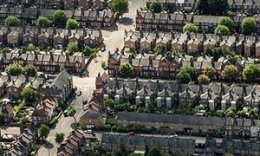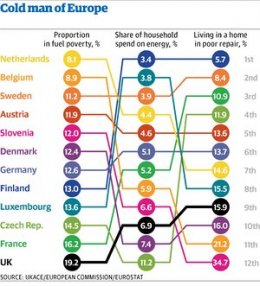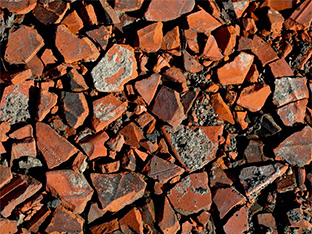British Houses
 Aerial view of north London. UK homes are the mostly costly to heat within EU, due to poor maintenance and insulation. Photograph: Dominic Lipinski/PA
Aerial view of north London. UK homes are the mostly costly to heat within EU, due to poor maintenance and insulation. Photograph: Dominic Lipinski/PA
UK homes are some of the most expensive to heat in Europe because of poor maintenance and insulation, according to new figures from the EU compiled for the Guardian.
The analysis of official EU data also found that the UK has the highest levels of fuel poverty of a dozen comparable EU nations, as well as one of the worst proportions of homes in a poor state of repair. Over 10m British families live in a home with a leaking roof, damp walls or rotting windows.
The expense of heating leaky homes means government plans to cut a programme that insulates properties in an attempt to trim energy bills is "unforgivably perverse", according to the government's fuel poverty adviser, Derek Lickorish.
He condemned the intention signalled by ministers to cut the energy company obligation (ECO) in George Osborne's autumn statement next Thursday. "ECO is a life-saving measure for some and we should be actually doing more. No one should be dying because they cannot afford to heat their home."
Andrew Warren, director of the Association for the Conservation of Energy, who speaks frequently to ministers, said: "It is absolutely disgraceful that the big energy companies have orchestrated this unscrupulous campaign, that appears to be succeeding in blackmailing the UK government into cutting by half its established policy to help customers stop wasting money by wasting fuel."
Ed Matthew, director of campaign group Energy Bill Revolution, an alliance of over 160 organisations including the TUC, IKEA, Asda and Shelter, said: "It is a national disgrace that thousands of people are dying unnecessarily every year, lives that could be saved by something as simple as better insulation. If Osborne cuts the total energy efficiency budget, as many fear, he will be condemning people to death."
COLD_MAN_WEB.pngThe new figures, compiled by the Association for the Conservation of Energy from official EU data, compares the UK with other EU states with similar climates and income levels, including Germany, France and the Benelux countries. The UK ranks bottom of the 12 for fuel poverty, 11th for the proportion of income spent on energy bills and 9th for homes in a poor state of repair.
Other data, from the Buildings Performance Institute Europe, shows that UK has the oldest houses in the EU, with over half built before 1960 and just over 10% built since 1991. Older UK homes require at least double the energy to stay warm compared with many countries, even those with colder climates such as Sweden.
 The political row over energy bills and the ECO levy has intensified ahead of the autumn statement, which will reveal the changes promised when David Cameron pledged to "roll back" green and social levies. The proposed changes to ECO would mean spending to help people insulate their homes was at the lowest level in over a decade. In February the prime minister said: "We are putting energy efficiency where it should be, at the heart of our energy policy. I want … to make Britain the most energy efficient country in Europe."
The political row over energy bills and the ECO levy has intensified ahead of the autumn statement, which will reveal the changes promised when David Cameron pledged to "roll back" green and social levies. The proposed changes to ECO would mean spending to help people insulate their homes was at the lowest level in over a decade. In February the prime minister said: "We are putting energy efficiency where it should be, at the heart of our energy policy. I want … to make Britain the most energy efficient country in Europe."
Paul King, chief executive of the UK Green Building Council, said: "We have some of the oldest and leakiest houses in western Europe, that is for sure. We have been very complacent about energy use for a very long time."
Warren said: "There has simply never been a concerted effort to tackle energy efficiency. The government's green deal programme was supposed to do it but that has failed for many reasons." The green deal, a loan scheme for retrofitting homes was intended to tackle 14m homes by 2020 but has managed just 219 in its first year.
"Any home built before the mid-1980s was built without any requirements at all for insulation, windows and so on, " said Warren. Building standards are better now, he said. "But even now, most homes built do not comply with the standards and government proposals to tackle that have been kicked into the long grass."
Lickorish, who chairs the government's fuel poverty advisory group, said: "It is unforgivably perverse that ECO – the only thing that can reduce the bills of consumers permanently – is the only thing the government is focusing on."
On Tuesday, the Office for National Statistics reported 31, 100 excess winter deaths in England and Wales in 2012, up by almost a third on the previous winter. "Not all winter deaths are due to fuel poverty but we understand very clearly the links between cardiovascular and other diseases and cold, damp homes, " said Lickorish, calling the level of deaths "morally unforgiveable".
He said: "The chancellor is prepared to insulate big business from [green levies] but not to insulate the homes of the fuel poor. The government is not protecting the vulnerable."






